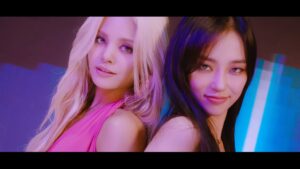
CLC has long been one of the great “what ifs” of K-pop. Talented and driven, capable of great things when given support, but perpetually neglected by their agency and never given a consistent identity. It was frustrating to watch as a fan, but one can only imagine how difficult it was for the members to actually live through. The latest track from Sorn, “Nirvana Girl”, explores the mark that experience left on her and fellow member Yeeun. While they sing about finding nirvana, it is clear that what they are really seeking is agency, and how those two concepts are, to them, interchangeable.
“Nirvana Girl” is an absolute treat for the eye; weaving current trends, pop culture history, social history, and Sorn’s own history into a masterclass of visual storytelling, all with a palette of vibrant colors filled with warmth. At first, “Nirvana Girl” seems to fall into the old tale of the entertainer lamenting the life they’ve chosen and longing for something else. However, Sorn stands out by drawing a sharp distinction in her frustrations and regrets: she does not object to the chaos, the instructions, or the workload. She objects to being controlled.
When we first see Sorn, she is in an outfit that immediately brings to mind “Black Dress”, one of CLCs best and best-known songs, and she objectively looks fantastic. Yet, she’s constantly pushing back, on edge, and just miserable because she’s being forced to play roles that do not fit her. On the second verse, Sorn is in a nearly-identical situation, having hair and makeup done for a photo shoot. This time, however, she is in charge. She dictates her look, she makes the decisions on her makeup, she calls the shots. And that ability to have the last word on her career is what Sorn sees as nirvana. Her ultimate peace and happiness is just not being treated like a doll anymore.
The styling only emphasizes Sorn’s desire for independence and control. The most obvious influence is the 90s aesthetics in Sorn’s apparel– crop tops, baggy jeans, bright pink, and a hairstyle that can only be described as “Britney blonde”, which given Britney Spears’ struggle to regain control over own life and image, cannot be coincidental. The 90s are also known for third-wave feminism and the “girl power” movement. These are two movements that sought to bridge the gap between femininity and feminism, arguing that being girly was feminist if it was a womans choice. Thus Sorn is asserting that her sexy, glamourous new persona is liberating and empowering for the sole reason that it is under her own control and what she wants to be.

Of course, the 90s did not exist in a vacuum. Much as 90s nostalgia is everywhere now, people in the 90s were crazy about the 70s. And the 70s have a very clear mark on “Nirvana Girl”, starting with the title. The 70s saw the hippie movement shift from political radicalism to the mainstream, carrying ideas like nirvana right along with it. Another idea that shifted from radical to mundane was women’s liberation. When Sorn flees from her makeup team, she runs through a very 70s house with 70s wallpaper, hides behind 70s sweaters, and transforms into her true self after glimpsing it on a 70s TV set. Drenched in the origins of women’s autonomy, Sorn finds her own.
Many of the other sets also carry through the 70s influences, but are always filtered through the lens of the 90s. The warmth of colors, the heavy use of paneled wood, flared jeans, disco floors, and neon lights are all vintage 70s. Yet shag carpet and avocado green are nowhere to be seen, stripped out by the previous filters.

Sorn’s look of “70s via 90s” becomes all the more clear when juxtaposed with Yeeun’s scenes. She is pure 90s throwbacks, preferring chrome, fluorescent lights, and a bandeau top paired with a flared skirt– a modern girl indulging in a past look, in contrast to Sorn’s layers of nostalgia that she’s gone all-in on. The difference becomes clearer when one realizes how out of place each looks on the others’ set. However, both are equally at peace, having found images that reflect who they are and want to be– and are willing to bend a bit for an old friend.
Sadly, the song itself doesn’t equal the MV. “Nirvana Girl” is a perfectly fine empowerment anthem, with Sorn and Yeeun’s lyrics having some sharp details that really elevate it. Sorn calls out the shallow discourse that surrounds much of the entertainment industry, while Yeeun’s crack about not only being her own wife, but her own mistress throws into relief how little women are still conditioned to expect from partners, and her pride in being someone who would rather be alone than be demeaned.

Where “Nirvana Girl” really stumbles is on the instrumentation. The bass is sufficiently funky, and the beat is smooth and slick, providing a good backdrop for Sorn’s huskier voice and sultry delivery. However, it lacks any sense of change or momentum. The groove is not melodic enough to carry a song, and there’s a distinct lack of hooks. Moreover, it is both slow and quiet, without any of the intensity needed to keep the audience invested. At the end of the day, “Nirvana Girl” just cannot stand on its own.
As an MV, “Nirvana Girl” is exquisite. It hammers home that true empowerment does not come from breaking norms or bold concepts– it comes from a woman’s ability to be who she is, whoever that is. Wrapped in the aesthetics of two significant eras that enabled Sorn to do just that, it drives home that for someone who spent years having her image dictated by others, she has found true peace in being able to call the shots.
(YouTube , Images via Wild Entertainment Group)



